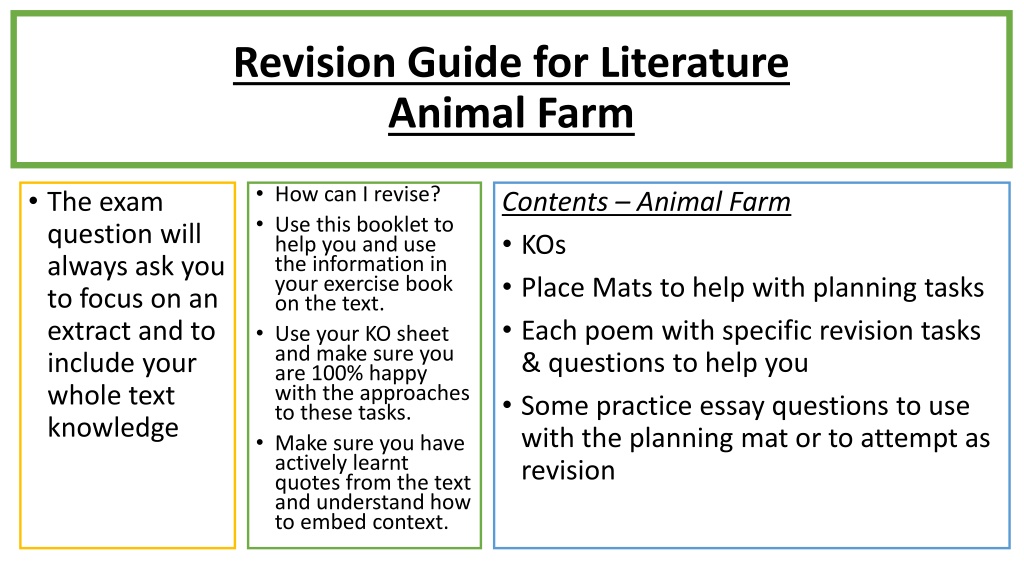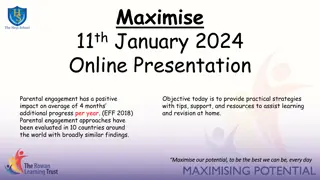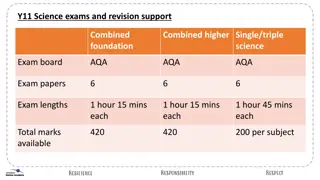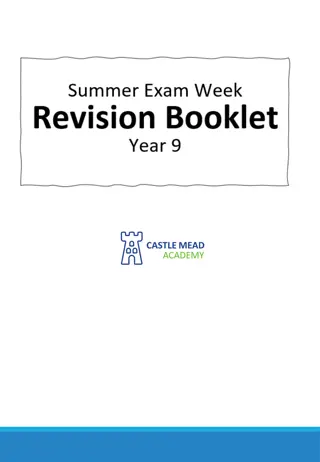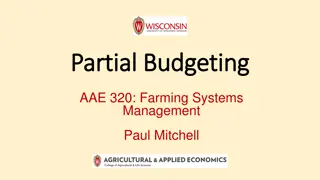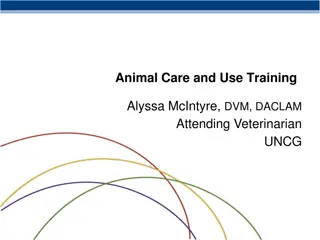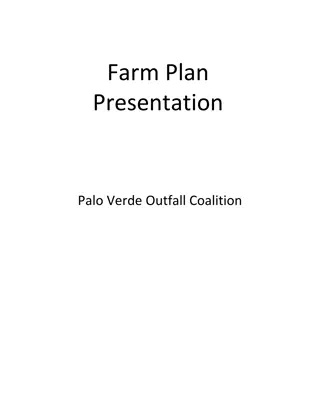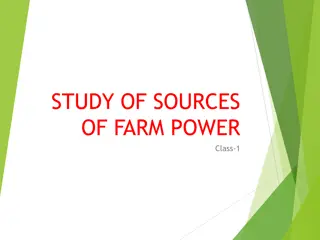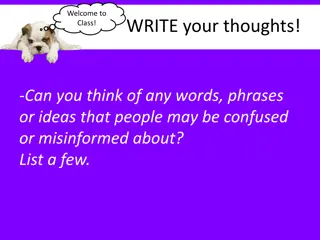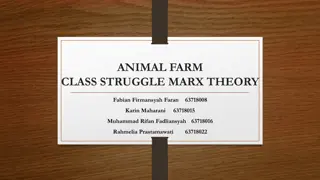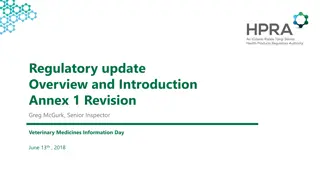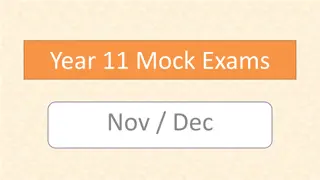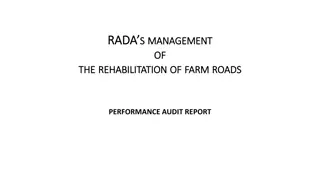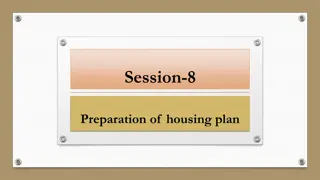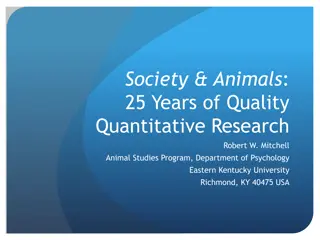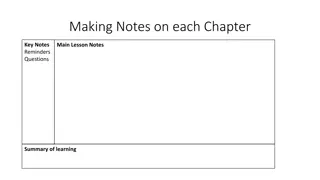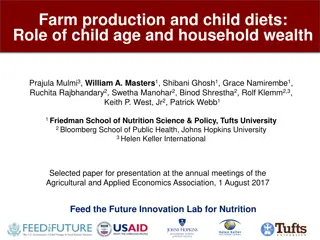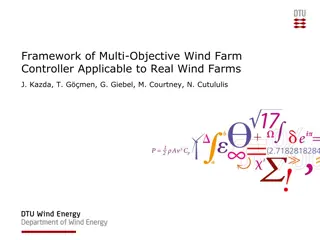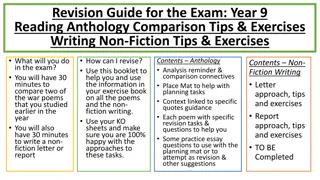Literature Revision Guide: Animal Farm Analysis Tips
Gain a thorough understanding of George Orwell's Animal Farm through this comprehensive revision guide focusing on key themes, characters, and analysis techniques. Learn how to effectively incorporate quotes, context, and writer's intentions into your essays to excel in your literature exams.
Download Presentation

Please find below an Image/Link to download the presentation.
The content on the website is provided AS IS for your information and personal use only. It may not be sold, licensed, or shared on other websites without obtaining consent from the author.If you encounter any issues during the download, it is possible that the publisher has removed the file from their server.
You are allowed to download the files provided on this website for personal or commercial use, subject to the condition that they are used lawfully. All files are the property of their respective owners.
The content on the website is provided AS IS for your information and personal use only. It may not be sold, licensed, or shared on other websites without obtaining consent from the author.
E N D
Presentation Transcript
Revision Guide for Literature Animal Farm How can I revise? Use this booklet to help you and use the information in your exercise book on the text. Use your KO sheet and make sure you are 100% happy with the approaches to these tasks. Make sure you have actively learnt quotes from the text and understand how to embed context. The exam question will always ask you to focus on an extract and to include your whole text knowledge Contents Animal Farm KOs Place Mats to help with planning tasks Each poem with specific revision tasks & questions to help you Some practice essay questions to use with the planning mat or to attempt as revision
Revision Guide for the Romeo and Juliet- Literature Analysis Tips & Exercises What you should/could cover in your analysis RED Minimum, ORANGE Most, GREEN Some (You know which you can aim to include) Not all of the steps need to be completed for each quote you select! Link to the question (RED) and say why you think it links Link to context Link to the terminology (Lang/Structure evaluating choice) (ORANGE) Short Quote(s) (RED) Explain meaning and effect both obvious and hidden (explicit and implicit) (RED) Zoom in on words/explore connotations and effect (ORANGE) Suggest what other readers might think/feel (offering an alternative opinion) (GREEN) Link to the writer s intentions (step out from the close analysis to give an overview of meaning) (GREEN) Explore a linking quote/supporting idea (GREEN) Always give an understanding of what is actually happening in the text at the point you are talking about. Make sure that you know what happens when and who is involved. Knowing this is as important as remembering lots of quotes. Always include context in your essay. Use the exam requirements section of the KO to help you think about how to write an essay. Avoid seeing context as something you add last. It needs to be embedded into the learning.
SKILLS ANIMAL FARM KO - Y11 AQA CHAPTER Guide to events Context Orwell was a Socialist. He despised the cruelties in the Soviet Union model of socialism. The novel is an anti-totalitarian novel. Each character represents different historical figures. Pig represent educated Russians who took power. Moses exploitation of religion in communism. The Sheep Russian Masses. Mr Frederick Hitler Mr Pilkington Capitalist govt of Britain & The USA. The Hens collective farmers ordered by Stalin to surrender their livelihoods. Mr Jones the Tzar Russian history And Stalin s rise to power Analysis Points: Link to the question Link to the terminology (Lang/Structure evaluating choice) Short Quote(s) Explain meaning and effect both obvious and hidden (explicit and implicit) Zoom in on words/explore connotations and effect Suggest what other readers might think/feel (offering an alternative opinion) Link to the writer s intentions (step out from the close analysis to give an overview of meaning) Explore a linking quote/supporting idea CH1 The animals hold a meeting to discuss overthrowing the humans. They decide on rules if they are successful. Vocabulary Definition Revolution Forcible overthrow of a government or social order CH2 The animals run the men off the farm & the Jones and rename it Animal Farm, destroying signs of slavery Animalism System designed by Old Major for a happy life free of human interference Commandments Seven rules by which the animals will live CH3 The animals work hard to collect the harvest, a committee is established & the pigs take more than their share of the rations. Unalterable Cannot be changed or adapted Equality Being equal CH4 Jones tries to retake the farm. News of it has spread & neighbouring farmers are worried. The animals win The Battle of the Cowshed. Untrustworthy Not being able to trust someone, deceitful Capitalism an economic & political system where a country's trade & industry are controlled privately for profit, rather than by the state. CH5 Mollie leaves the farm. Napoleon takes over all the decisions. Socialism An economic & political system where trade & industry are controlled centrally for the CH6 The pigs move into the farmhouse, they trade and the animals work hard to farm and build the windmill, overcoming setbacks. A storm destroys the windmill. good of all Patriotic Being devoted to your country EXAM REQUIREMENTS Corruption Dishonesty or fraudulent behaviour by rulers ESSAY CH7 Napolean starves the hens when they refuse to lay more eggs, he convinces them off a different version of The Battle of the Cowshed. Republic A state where power is held by the people & their elected officials (America is a republic) (Britain is a Monarchy) ESSAY : Intro link to the question with overview of meaning. Explain which events in the text you will focus on. Idea 1 - choose a moment from the text to explore with quotes & context Idea 2 - choose a 2nd moment from the text to explore with quotes & context - Idea 3 - choose a moment from the text to explore with quotes & context - Idea 4 choose a moment to explore with quotes and context Conclude Short summary of points INCLUDE CONTEXT Exploitation Treating someone unfairly to benefit from CH8 The pigs re-read the commandments, change them and get drunk. Frederick buys timber with forged money & blows up the windmill. their work Anti totalitarian Non-tolerance of people who have different opinions & a system of dictatorship Terminology Definition CH9 Th piglets go to school, the farm becomes a republic with Napoleon as the President, Boxer looks forward to retiring, his strength fails and he is sent to the slaughterer. Most animals don t realise & whiskey arrives from the money confusing them. Symbolism use of symbols to represent ideas or qualities Imagery visually descriptive language Motif a recurring set of words/phrases or imagery for effect CH10 Time passes, animals die, the conditions are poor for most and the pigs act like humans. The other animals can t tell the animals from the humans. Allegory extended metaphor in which a symbolic story is told Omniscient third person narrative All knowing narrator who is not involved in the action but sees it all happening
Character Quotes & Technique Ch 1. Clover was a stout motherly mare approaching middle life. , Ch 2. these two (Clover and Boxer) had great difficulty in thinking anything for themselves,. Clover learnt the whole alphabet, but could not put words together. Clover warned him sometimes to be careful not to overstrain himself. Cloverlooked down the hillside her eyes filled with tears. not what they had aimed at when they had set themselves year ago to work for the overthrow of the human race. (ch7) Such were thoughts, though she lacked the words to express them. (ch7) They accepted everything that they were told about the Rebellion and the principles of Animalism, especially from Clover. Clover Ch 1. Mollie, the foolish, pretty white mare hoping to draw attention to the red ribbons it was plaited with. Ch2. The stupidest questions of all were asked by Mollie, the white mare. Shall I still be allowed to wear ribbons in my mane? Ch3. Mollie, it was true, was not good at getting up in the morning. Mollie refused to learn any but the six letters which spelt her own name. Ch4. She was found hiding in her stall Ch 5. run away from work and go to the drinking pool stand gazing foolishly at her own reflection. Ch1. oldest animal on the farm, and the worst tempered. He seldom talked, usually to make some cynical remark. Ch3. Old Benjamin, the donkey, seemed quite unchanged since the Rebellion. When asked whether he was not happier now that Jones was gone, he would say only Donkeys live a long time. None of you has ever seen a dead donkey. Benjamin was the only animal who did not side with either faction (Ch5) Only old Benjamin refused to grow enthusiastic about the windmill. (Ch6) Ch1. Boxer was an enormous beast, nearly eighteen hands high, and as strong as any two ordinary horses put together. universally respected for his steadiness of character and tremendous powers of work. Ch3. Boxer with his tremendous muscles always pulled them through. Boxer was the admiration of everybody. His answer to every setback, was I will work harder. Boxer could not get beyond the letter D. Ch4 But the most terrifying spectacle of all was Boxer, rearing up on his hind legs and striking out with his great iron-shod hoofs like a stallion. He is dead , said Boxer sorrowfully. Ch6. His two slogans, I will work harder and Napoleon is always right , seemed to him sufficient answer to all problems. I do not understand it. I would not have believed that such things could happen on our farm. It must be due to some fault in ourselves. (ch7) What victory? said Boxer. His knees were bleeding, he had lost a shoe and split his hoof, and a dozen pellets had lodged themselves in his hide. (ch8) Mollie Benjamin Boxer Moses 'Mrs. Jones looked out of the bedroom window, saw what was happening, hurriedly flung a few possessions into a carpet bag Moses sprang off his perch and flapped after her, croaking loudly. , He claimed to know of the existence of a mysterious country called Sugarcandy Mountain, , The animals hated Moses because he told tales and did no work , Moses the raven suddenly reappeared on the farm, after an absence of several years. Many of the animals believed him. Their lives now, they reasoned, were hungry and laborious; was it not right and just that a better world should exist somewhere else? They [the pigs] all declared contemptuously that his stories were lies, The three pigs Napoleon Never mind the milk, comrades , He lifted his leg, urinated over the plans and walked out without uttering a word , Napoleon announced that the windmill would be built after all , There were piles of corpses lying at Napoleon s feet Squealer: The animals were not sure what the word meant, but Squealer spoke persuasively , Surely there is no one among you who wants to see Jones come back? Many of us actually dislike milk and apples Snowball At the meetings, Snowball often won over the majority by his brilliant speeches , "Comrade," said Snowball, "those ribbons that you are so devoted to are the badge of slavery. , Can you not understand that liberty is worth more than ribbons? , "Now, comrades," cried Snowball, throwing down the paint-brush, "to the hayfield! Let us make it a point of honour to get in the harvest more quickly than Jones and his men could do. [this quotation refers to his being chased from the farm] slipped through a hole in the hedge and was seen no more. The Sheep When they had once got it by heart, the sheep developed a great liking for this maxim, start bleating "Four legs good, two legs bad! Four legs good, two legs bad! , It went on for five minutes without stopping. the chance to utter any protest had passed. Muriel Muriel, the goat, could read somewhat , better than the dogs, and sometimes used to read to the others in the evenings from scraps of newspaper which she found on the rubbish heap , Finding herself unable to read more than individual letters, she fetched Muriel . , "It says, 'No animal shall sleep in a bed with sheets,"' she announced finally. Mr Frederick terrible stories were leaking out from Pinchfield , He had flogged an old horse to death, he starved his cows, he had killed a dog by throwing it into the furnace, and he amused himself in the evenings by making cocks fight with splinters of razor-blade tied to their spurs. The animals' blood boiled with rage Mr Pilkington These two [Frederick and Pilkington] disliked each other so much that it was difficult for them to come to any agreement . But at the moment the four pigeons who had been sent there [Pilkington s farm] the day before returned bearing a scrap of paper from Pilkington. On it were penciled the words serves you right . Jessie and Bluebell a terrible baying sound outside, escape their snapping jaws. , the farm had grown richer without making the animals themselves any richer except, of course, for the pigs and the dogs. The Hens And you hens, how many eggs have you laid in this last year, and how many of those eggs ever hatched into chickens? The rest have all gone to market to bring in money for Jones and his men? , Under the guidance of our leader, Comrade Napoleon, I have laid five eggs in six days ., He [Snowball] formed the Egg Production Committee for the hens. , The hens, who had just come in to lay again, must surrender their eggs. When the hens heard this, they raised a terrible outcry. Minimus Animal Farm, Animal Farm, Never through me shalt thou come to harm
Consider: The structure of text. 'All animals are equal - but some are more equal than others Transform: When the downtrodden animals of Manor Farm overthrow their master Mr Jones and take over the farm themselves, they imagine it is the beginning of a life of freedom and equality. But gradually a cunning, ruthless lite among them, masterminded by the pigs Napoleon and Snowball, starts to take control. Soon the other animals discover that they are not all as equal as they thought, and find themselves hopelessly ensnared as one form of tyranny is replaced with another. 'It is the history of a revolution that went wrong - and of the excellent excuses that were forthcoming at every step for the perversion of the original doctrine,' wrote Orwell for the first edition of Animal Farm in 1945. Orwell wrote the novel at the end of 1943, but it almost remained unpublished; its savage attack on Stalin, at that time Britain's ally, led to the book being refused by publisher after publisher. Orwell's simple, tragic fable has since become a world-famous classic. When is utopia achieved (if ever)? What happens at the start, the middle and end of the text? What is Orwell showing through the circular narrative? Describe the story of the animal farm as a poem. Criticise: Communism. Prioritise: Communists believe that equality can be gained through sharing property equally in society. How does Orwell attack this ideal? Themes What are the themes in the play and how are they shown throughout the text?
Transform: Power is a social construct explore the elements of power that the pigs manipulate throughout the text. Consider: Extract from Chapter 3 to start with use your knowledge of the whole text for all tasks Place Power Law People The pigs did not actually work, but directed and supervised the others. With their superior knowledge it was natural that they should assume the leadership. Boxer and Clover would harness themselves to the cutter or the horse- rake (no bits or reins were needed in these days, of course) and tramp steadily round and round the field with a pig walking behind and calling out "Gee up, comrade!" or "Whoa back, comrade!" as the case might be. And every animal down to the humblest worked at turning the hay and gathering it. What could you say about these elements in relation to the allegorical tale Animal Farm? Criticise: The Pigs. Prioritise: Vocabulary choices by and for the Pigs. How might a Orwellian audience have reacted to the behaviour of the pigs? How might a contemporary audience now feel? What language do they use? What language does the omniscient narrator use? What language do the other animals use?
Transform: Summarise the advice Boxer gives to himself and the impact that this has on the other animals. Consider: What does Benjamin imply about Boxer? What can we learn from his silence throughout the novella? What kind of impression do we get of him? Chapter 3 extract Boxer was the admiration of everybody. He had been a hard worker even in Jones's time, but now he seemed more like three horses than one; there were days when the entire work of the farm seemed to rest on his mighty shoulders. From morning to night he was pushing and pulling, always at the spot where the work was hardest. He had made an arrangement with one of the cockerels to call him in the mornings half an hour earlier than anyone else, and would put in some volunteer labour at whatever seemed to be most needed, before the regular day's work began. His answer to every problem, every setback, was "I will work harder!"--which he had adopted as his personal motto. Prioritise: Choose your top five quotes about Boxer and Benjamin and explode them with: Meaning/Effect Exploration of the context that links & why Zooming in on a word in the quote Use triplets to develop your ideas Focus on context Exploration of the connotations Criticise: Boxer is too good, too kind and too forgiving of the pigs Challenge this statement
Chapter 5 Transform: Create a bullet point list to show how the dogs help to take over the farm from collective ownership to a dictatorship. Consider: Power How is power manipulated through the dogs and what do they represent? How do the sheep help maintain this power? At this there was a terrible baying sound outside, and nine enormous dogs wearing brass-studded collars came bounding into the barn. They dashed straight for Snowball, who only sprang from his place just in time to escape their snapping jaws. In a moment he was out of the door and they were after him. Too amazed and frightened to speak, all the animals crowded through the door to watch the chase. Snowball was racing across the long pasture that led to the road. He was running as only a pig can run, but the dogs were close on his heels. Suddenly he slipped and it seemed certain that they had him. Then he was up again, running faster than ever, then the dogs were gaining on him again. One of them all but closed his jaws on Snowball's tail, but Snowball whisked it free just in time. Then he put on an extra spurt and, with a few inches to spare, slipped through a hole in the hedge and was seen no more. Prioritise: Napoleon (use your knowledge organiser to help you): Meaning/Effect Exploration of the context that links & why Zooming in on a word in the quote Use triplets to develop your ideas Focus on context Exploration of the connotations Criticise: Napoleon s intent is clear and his continual manipulating behaviour is foreshadowed by Orwell Challenge this statement
Transform: Find examples of vocabulary that show Orwell is making a point about the dictatorial nature of the farm now and the unfairness on the animals. Consider: The way Orwell describes the humans at this point in the novella and how this keeps the animals in check. What do the humans represent now? Chapter 6 All that year the animals worked like slaves. But they were happy in their work; they grudged no effort or sacrifice, well aware that everything that they did was for the benefit of themselves and those of their kind who would come after them, and not for a pack of idle, thieving human beings. Criticise: The simile worked like slaves is deliberately placed at the start of Chapter 6 Prioritise: The context of the novella what is Orwell mimicking and criticising throughout the whole novella? Challenge this statement
Chapter 8 extract Transform: Write a poem to show the examples of deceit that have become evident throughout the novella. Consider: What were the original seven commandments and how do they have biblical significance. Also, how are they being broken throughout the novella? A few days later, when the terror caused by the executions had died down, some of the animals remembered or thought they remembered that the Sixth Commandment decreed "No animal shall kill any other animal." And though no one cared to mention it in the hearing of the pigs or the dogs, it was felt that the killings which had taken place did not square with this. Clover asked Benjamin to read her the Sixth Commandment, and when Benjamin, as usual, said that he refused to meddle in such matters, she fetched Muriel. Muriel read the Commandment for her. It ran: "No animal shall kill any other animal without cause." Somehow or other, the last two words had slipped out of the animals' memory. But they saw now that the Commandment had not been violated; for clearly there was good reason for killing the traitors who had leagued themselves with Snowball. Prioritise: Deception Find examples that the animals are aware that they are being deceived but cannot quite grasp this 100% Criticise: The stupidity of the animals who represent the proletariat they are as much to blame for the situation as Napoleon "No animal shall kill any other animal without cause. Explain which animal is the most aware and why? Give your opinions and thoughts with evidence on this idea
Transform: Create a summary of the story of animal farm and its allegorical significance reflecting all the events and the circular nature of events. Consider: What were Orwell s intentions? Chapter 10 and out came Napoleon himself, majestically upright, casting haughty glances from side to side, and with his dogs gambolling round him. He carried a whip in his trotter. There was a deadly silence. Amazed, terrified, huddling together, the animals watched the long line of pigs march slowly round the yard. It was as though the world had turned upside- down. Then there came a moment when the first shock had worn off and when, in spite of everything in spite of their terror of the dogs, and of the habit, developed through long years, of never complaining, never criticising, no matter what happened they might have uttered some word of protest. But just at that moment, as though at a signal, all the sheep burst out into a tremendous bleating of "Four legs good, two legs better! Four legs good, two legs better! Four legs good, two legs better!" What is he warning society about? How do the warnings fit with his own disillusionment with communism? Criticise: Napoleon and the pigs greed. Prioritise: What point in the novella is it evident that there is no going back for the animals and that they will be stuck in another unfair regime? Explore how the pigs greed has made them exactly the same as the humans they usurped in Chapter 1.
